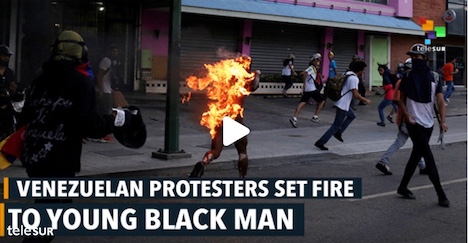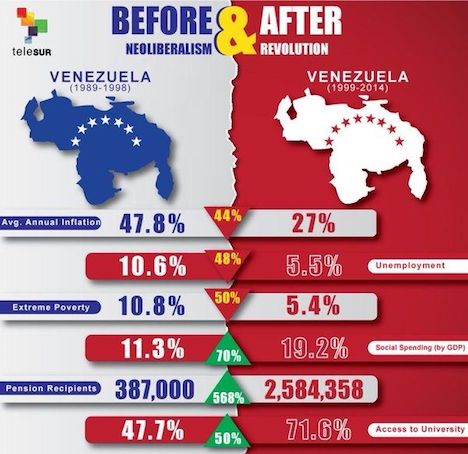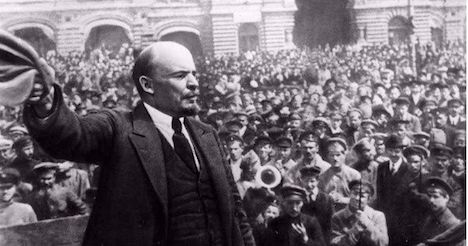| Freedom. Democracy. Stability. These are the demands that mainstream media will have you believe are behind ongoing anti-government opposition protests in Venezuela, which have since claimed over 50 lives. Borrowing plot lines from “David and Goliath,” the alphabet soup of corporate news outlets perpetuate the same ill-conceived dichotomy. On one side are the powerless, peace-loving democrats protesting for political freedom. On the other side is the powerful, violent authoritarian government fighting against those demands. This narrative, indisputably dominant in mainstream media, is intentionally designed to engender support for regime change in Venezuela. Outlets like CBS, CNN, NBC, ABC, Fox News and The New York Times, for example, are owned by wealthy global elites who are top investors within the military-industrial complex and profit handsomely from endless war. Publications like the Miami Herald exemplify mainstream media’s drive for war by publishing pieces suggesting “What Trump should do about Venezuela’s drift toward a full-blown dictatorship.” This falls entirely in line with their wealthy corporate backers, who salivate over the idea of recolonizing and privatizing Venezuela’s vast oil resources. Their rallying cries for U.S. action against Venezuela resemble those made against Yugoslavia, Afghanistan, Iraq and Libya before their respective invasions in 1999, 2001, 2003 and 2011. Anyone who has closely followed these invasions, however, can attest to the central role inaccurate mainstream media reports have played in facilitating their disastrous outcomes.
Let’s not forget that in 2003, for example, establishment news propagated a disastrous lie: the claim that the Iraqi government was then in possession of “weapons of mass destruction.” But as the U.S.-led Iraq Survey Group was forced to admit in 2003, there was zero evidence that the Iraqi government had produced or stockpiled any weapons of mass destruction since 1991. That was the year United Nations sanctions were imposed against the administration of former President Saddam Hussein. The results of this lie, as history has shown, were catastrophic. Tens of thousands of Iraqi civilians and combatants died, thousands more were violated and injured and entire cities were left in ruin. Moreover, the same media outlets that served as cheerleaders for this illegal invasion, justified with unsubstantiated claims, are the same ones that beat the drums of war against Yugoslavia in 1999, Afghanistan in 2001 and Libya in 2011. And in present times, they’re beating the drums of war against Venezuela. That’s why those who truly want to understand what’s going on in Venezuela can’t rely on publications that have the economic interests of their wealthy corporate backers at heart. Those seeking the truth about protests in Venezuela must ground their investigation in the interests of the working class masses who would be most affected by any attack or invasion against the socialist country. Marxism, a method of studying and responding to world events, is best suited for this since it is fundamentally based on advancing the best interests of workers, the majority, and not wealthy elites, the minority. And as will later be shown, it demonstrates that the worker-led government is truly promoting freedom, democracy and stability, not the Wall Street-backed opposition. Here’s what Marxism, the revolutionary science of the working class, teaches us about protests in Venezuela.
We need a new method of analysis One of the biggest problems inherent in mainstream media coverage of protests in Venezuela is their method of analyzing them. If you take a close look at most articles or videos produced by establishment publications, you’ll notice an underlying trend. They discuss present-day turmoil in Venezuela without providing adequate historical context. Not only do they intentionally leave out the incessant economic and political attacks waged against the Bolivarian Revolution since taking power in 1999, which have hampered the government’s ability to advance peace and stability. They also fail to mention what the country was like before 1999 when late President Hugo Chavez took office and began radically improving conditions for Venezuela’s working-class majority. Since the early 2000s, for example, supermarket owners affiliated with Venezuela’s opposition have hoarded food products so they can resell them at higher prices and make large profits. Food importing companies owned by the country’s wealthy right-wing elite are also manipulating import figures in order to raise prices on goods. In 2013, former Venezuelan Central Bank chief Edmee Betancourt reported that the country lost between US$15 and US$20 billion dollars the previous year because of hoarding and price manipulation. Right-wing sabotage of Venezuela’s socialist economy, which has been waged on numerous fronts since 1999, serves to bolster political attacks against the government. This tactic of destabilization, expounded upon by U.S. political scientist Gene Sharp, has been used against governments opposed to Wall Street from time immemorial. Mainstream media also fail to mention that prior to the 1999 Bolivarian Revolution, Venezuela had much higher rates of inflation, unemployment and poverty.
This method, which presents facts and figures about disarray in Venezuela without providing historical context, is known as empiricism. Empiricism, a method of natural and social sciences, posits that all knowledge about the world derives from sensory experience. This means that the five senses — sight, hearing, smell, taste and touch — shed insight on reality that can be tested, revised and verified by all. Thus, one is able to make judgments about Venezuela based on what they see people doing, hear people saying and even smell, taste or touch in the country. Moreover, one can create quantitative measurements for these qualitative judgments, establishing universally-accepted figures like gross domestic product, Gini coefficients and even levels of happiness. Marxism does not outright reject empiricism — at times, it even borrows from it. What Marxism maintains, however, is that this liberal method of analysis is severely deficient in its ability to grasp the complexities of a particular phenomenon in its entirety. That’s because it analyzes phenomena, such as unrest in Venezuela, as static, disconnected moments of time instead of understanding them as interconnected moments that form a constantly changing and evolving process. It separates the “relevant” present from the “irrelevant” past, decontextualizing phenomena in their entirety. This is the equivalent of criticizing a teacher for not having her students pass year-end exams, not taking into account that for most of the year she was overloaded with students and worked with a meager budget. Marxism, then, does not reject that there are rising inflation and shortages in Venezuela. What it does reject is presenting these figures without proper context and limiting the investigation to narrow appearances, allowing reality to be distorted. Marxism proposes expanding the scope of analysis beyond present-day facts, investigating the root economic causes of phenomena like inflation and putting forth practical solutions for their resolution. Thus, empirical analyses made by corporate news outlets about protests in Venezuela prove to be ideologically bankrupt. They intentionally present facts about turmoil in Venezuela in a way that incriminates the government and exonerates the opposition.
Not all protests are revolutionary. Not all governments are reactionary. Another problem plaguing mainstream media coverage of protests in Venezuela is their false characterization of protesters and the government. As mentioned earlier, corporate news outlets paint protesters as powerless, peace-loving democrats while portraying government officials as powerful, violent authoritarians. When covering anti-government demonstrations, they often show images of opposition protesters holding seemingly progressive signs with slogans like “No More Dictatorship” and “Justice for Political Prisoners.” They have also shown them handing flowers to police officers, crying and pleading with them to “stop the violence.” Conversely, when presenting police officers and the Bolivarian National Guard on television, they only show them firing water cannons and pushing off protesters with their shields. Moreover, they almost never show images of the thousands of leftist, pro-government supporters who peacefully march in support of the Bolivarian Revolution almost daily. This superficial portrayal of turmoil in Venezuela by mainstream media misleads viewers into believing that the right-wing protesters are revolutionary and that the left-wing government is reactionary. Consequently, these viewers falsely associate the former with movements like Occupy Wall Street and Black Lives Matter and the latter with regimes like apartheid South Africa. Marxism, however, contends that this dichotomy is a perverse inversion of reality. It maintains that the Bolivarian government is, in fact, revolutionary and that the opposition is reactionary. This conclusion is grounded in the Marxist theory of the state, elaborated by Russian revolutionary Vladimir Lenin. The Marxist theory of the state argues that governments are instruments of domination by one economic class over another. In capitalist societies, like the U.S., where the rich represent the ruling class, wealthy elites use the state to rule over the poor. This is exemplified by the way in which corporations are able to use police to suppress workers and oppressed communities protesting for better standards of living. In societies moving toward socialism, like Venezuela, where the government represents the poor, workers and oppressed people are still fighting wealthy elites, but are better able to control them. In March, for example, President Nicolas Maduro ordered the seizure of bakeries owned by right-wing elites who were intentionally hoarding flour, later handing over control of the businesses to workers’ collectives. Marxism also denies the claim that all states are of a bourgeois character, an argument many anarchists hold fast to. Rather, the state is a reflection of the economic class that wields power over it. And while Marxists assert that governments will cease to exist under advanced stages of communism, they maintain that they are necessary in the early stages of the transition from capitalism to socialism. This is referred to as the withering away of the state. In line with this understanding of the state, Marxists argue that not all anti-government protests are revolutionary, which many liberals and anarchists fail to realize. Immediately after 1917, for example, when the Bolsheviks carried out Russia’s socialist revolution, the U.S. and the U.K. began supporting groups like the White Army and the Revolutionary Insurrectionary Army of Ukraine. The first was composed of far-right nationalists and the second was made up of ultra-left anarchists — both groups, though ideologically opposed, fought tooth and nail to try to overthrow the Bolshevik government in an unholy alliance. Following the rise of socialist revolutions across Eastern Europe throughout the 20th Century, the U.S. and U.K. began supporting “pro-democracy” protests in countries like the Czechoslovak Socialist Republic. Backed by wealthy multinational elites, these “pro-democracy” protesters claimed the Soviet Union-backed government was committing “human rights abuses” and that it was mismanaging the economy, just like the Venezuelan opposition alleges. Toward the turn of the 20th Century, these Western-backed “democrats” began leading color revolutions, which led to the dismantling of socialist governments and the implementation of neoliberal austerity. Today, the countries run by the leaders of color revolutions — like Georgia, Ukraine, the Czech Republic and Slovakia — have some of the highest rates of unemployment, crime, prostitution and food insecurity. Marxism, which takes economics, and not aesthetics, as its basis of analysis, demonstrates that not all protests are revolutionary and that not all governments are reactionary.
Capitalism is at a dead end. So is the opposition. Venezuela’s right-wing opposition leaders frequently claim that the Bolivarian Revolution’s socialist economic model is to blame for most of the country’s problems. Uncritically regurgitating economic views spoon-fed to them by Wall Street think tanks, they claim that free-market capitalism will solve all of Venezuela’s troubles. “Socialism creates bureaucracy,” they claim, suggesting that private companies should take over the country’s healthcare, education, food and housing systems. Opposition leaders like Leopoldo Lopez, who has questionable connections to multinational oil giants like ExxonMobil, have even proposed privatizing the state-run Petroleum of Venezuela company, one of the country’s main sources of wealth. They have also suggested eliminating important government institutions like the ministries of Indigenous Peoples, Women and Gender Affairs in a bid to “restore economic stability.” While it remains undeniable that Venezuela is undergoing serious economic problems, the opposition falsely attributes the root cause of these problems to socialism. They fail to take into account that attempts to fortify a stable command economy have been sabotaged since 1999. They consistently run their mouths about the “failures of socialism” while simultaneously attacking it to ensure it doesn’t succeed. Their rhetoric is comparable to blaming an architect for not building a house fast enough without taking into account that the construction site has been looted and vandalized on a daily basis since its inception. The Bolivarian Revolution, however, has accomplished tremendous social advancements, despite not having one day of respite from right-wing economic sabotage throughout its 18-year tenure. Still, the opposition, mainstream media and Wall Street claim that Venezuela will be better off if it adopts capitalism as its economic system. But if one wants to know what Venezuela would become if the opposition was successful in removing the Bolivarian government and imposing capitalism, they only have to take a look at the neoliberal disasters that are Brazil and Argentina. Since Argentine President Mauricio Macri took office in 2015, he has reversed all of the progressive gains made by leftist former President Cristina Fernandez. The right-wing leader, an outspoken critic of the Venezuelan government, has implemented austerity programs across numerous sectors of the country's economy. Gas and electricity prices are rising. Jobs are being cut. Government institutions are downsizing while private companies linked to the ruling administration are getting tax cuts. All of these policies have resulted in growing poverty, instability and unrest in Argentina. The same holds true for Brazil. Since de facto Brazilian President Michel Temer took office in 2016, he also reversed all of the social gains made by former progressive President Dilma Rousseff. Consequently, millions of Brazilians have been plunged into poverty, police repression against Afro-Indigenous groups has intensified and labor rights in the countryside have essentially ended, effectively allowing practices that are considered by the country’s penal code as being equal to slavery. Temer, another staunch critic of the Bolivarian Revolution, also faces growing opposition from Brazilians who are suffering under neoliberal austerity. Even if the Venezuelan opposition was successful in taking state power, like Macri and Temer, the country’s problems would be far from being solved. This is because their beloved capitalism, a system entirely driven by profits, is inherently unstable — and as Karl Marx put it himself, capitalism is self-cannibalistic. Marx posited that capitalism creates constant crises within society because of the tendency of the rate of profit to fall. Profit is defined as financial gain accumulated from the difference between the amount earned and the amount spent in buying, operating or producing something. As workers around the world make less money because of neoliberal austerity, they are unable to purchase the same products they produce as consumers. This creates a situation where private companies are unable to sell their products because no one has enough money to buy them, hindering the companies from making profits. This situation is being played out on a global scale, facilitating the deterioration of markets and paving the way for a looming international financial crisis. And as capitalism continues to reach a decline that it can not overcome, as it reaches a dead end, its credibility becomes more questionable as time progresses. The Venezuelan opposition, like capitalism, have nothing to offer the South American country. Both have reached a dead end. Source URL |




